Kissinger’s Curse
One of the most infamous characters in modern history is Henry Kissinger. His musings and policy recommendations have shaped much of the Western world today, warts and all; and there are many warts. Population control, nuclear proliferation, Middle East wars, de-pegging of the USD from gold, the rise of China, the impending collapse of the West and so much more can all trace their roots back to Henry Kissinger.
Generally regarded as the ultimate neo-conservative, Henry Kissinger was loathed by his ideological opponents:

https://www.newyorker.com/magazine/2020/05/18/the-myth-of-henry-kissinger
However, his character could best be judged by those who opposed him for so many decades.
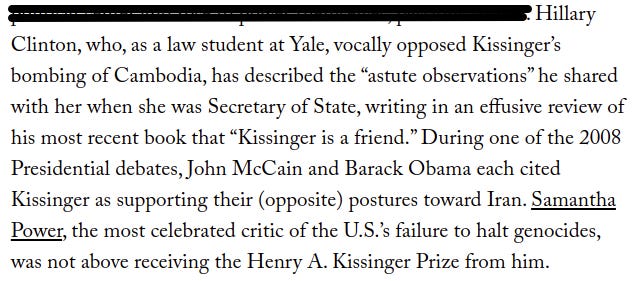
Need we say more?
Kissinger’s family fled Jewish persecution in Germany and arrived in America in 1938. The family settled in Washington Heights, which was the home to many other German immigrants that the place became colloquially known as the Fourth Reich. Years later, Kissinger would refer to his affinity with totalitarianism:

In 1943, Kissinger was drafted into the US Army. He was recruited into military intelligence by Fritz Kraemer. Fritz had an enormous influence on Kissinger, as well as other future politicians like Donald Rumsfeld and Alexander Haig. Unsurprisingly, Fritz also immigrated to America from Germany:

After WWII, Dr. Fritz Kraemer was considered a legend in the halls of the Pentagon:


No matter what anyone thinks of Fritz Kraemer, herein lies the dilemma: His Prussian traditions led him to the belief that a “noble elite” was required to run Western democracies. A government “for the people, by the people” was an unacceptable risk to the State. Instead, a government must be “for the people, by the chosen elite”. Fritz’s ideology permeated through the central intelligence agencies. The ‘kult of Prussia’ was now on full display, and Kissinger was his prime choice to shape America’s future.
The other man that influenced Kissinger’s thinking was his teacher at Harvard, William Yandell Elliot. Elliot “would eventually be a political advisor to six US presidents and would also serve as a mentor to Zbigniew Brzezinski and Pierre Trudeau, among others.”
Judging by the company Kissinger kept in his early years, it should not be surprising that his outlook on world affairs was decidedly Prussian. He would deny it if asked, but Kissinger was uber Bismarckian. A man who would take Realpolitik to its extreme:
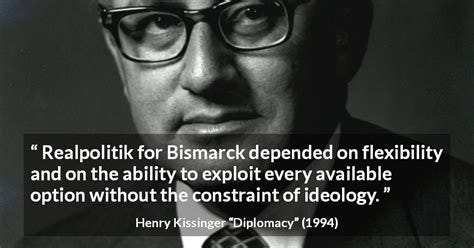
Kissinger no doubt was a disciple of Hegelian philosophy. Understanding the principles of the master-slave dialectic, he defended the idea that true power involved the complete submission to authority.
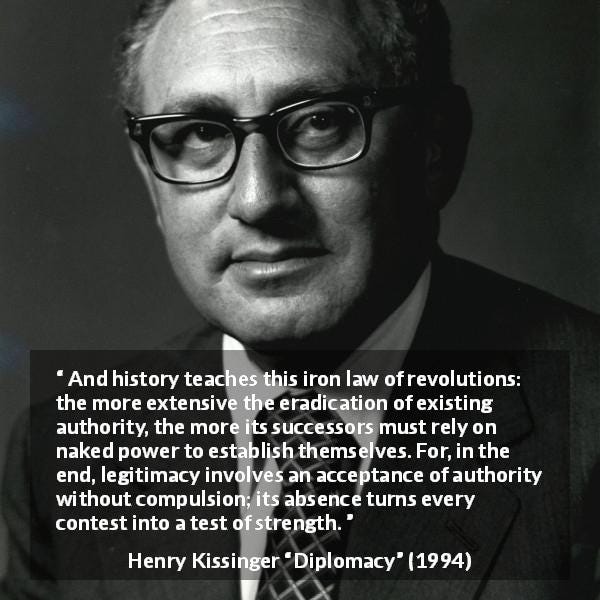
Everything about Kissinger’s philosophy is completely un-American. A Republic built on the values of freedom and unalienable individual rights does not require an unelected bureaucratic noble elite to make decisions on behalf of its citizenry.
In fact, everything about Kissinger’s philosophy supported the traditions of Prussia; a State that uses any means possible to survive and thrive on the world stage. Prussia was a State that used a noble elite to make decisions for the people, no matter how draconian, unpopular or deadly. They used war as its principle means of bringing about the complete submission of its enemies. The playbook remains the same today.
Kissinger’s education would provide the tools necessary to implement his ideological framework in America and then upon the world. His career accomplishments would have brought a tear to the eye of Frederick the Great, Hegel, Marx and every other Prussian who served their providential master; Prussia.
Nuclear Weapons
In 1951, Kissinger began his employment working for the military and was trained in the art of psychological warfare. In 1954, Kissinger joined the Council on Foreign Relations. He managed a study group on nuclear weapons and subsequently published a 490-page book titled, “Nuclear Weapons and Foreign Policy”.
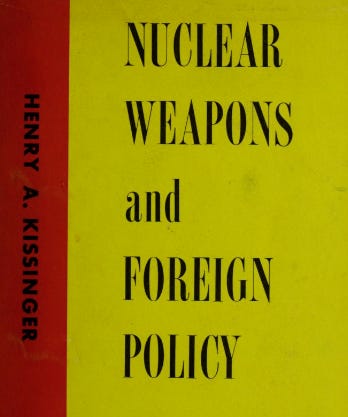
https://archive.org/details/nuclearweaponsfo00kiss/mode/2up

This quote illustrates Kissinger’s cavalier approach to the use of nuclear weapons. Throughout the 1950s, Kissinger and another military strategist and nuclear enthusiast, Hermann Kahn, would sprout out theories from the CFR on the political and military use of nuclear weapons. They would shy away from being described as Realpolitik, and instead described themselves as pragmatic, political realists.
However, this somehow did not benefit the United States, as other countries would also acquire nuclear weapons. Kissinger was the National Security Advisor when it was discovered that Israel had a nuclear program. At every turn Kissinger was aware of the nuclear situation:

Kissinger was also involved in the France becoming a nuclear power:
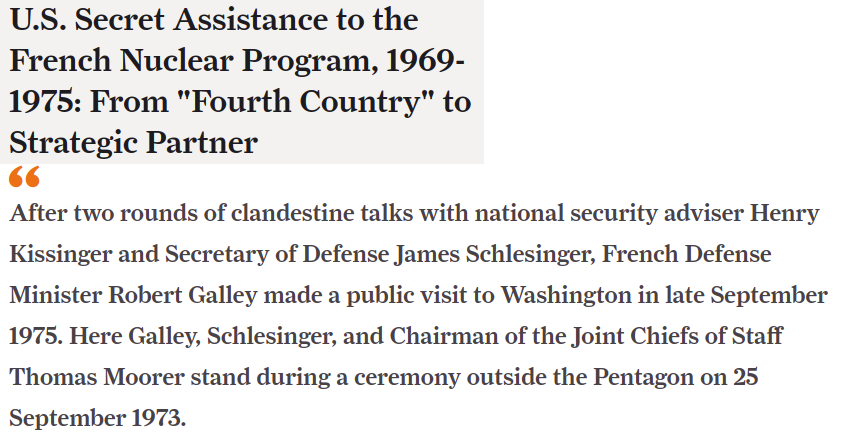
By the 1970s, everyone was trying to get their hands on nukes. India had its first nuclear explosion in 1974. Soon after, Brazil was keen to get in on the nuke party. Kissinger’s response to the Brazil’s ambitions?

On the question of India’s nuclear program, Kissinger wanted to agitate India, using China.

While America was in the heat of the Vietnam war, Kissinger was encouraging more wars. During this time, Kissinger even approved the bombing and eventual invasion of neutral Cambodia:


When we look back at the original book published by Kissinger in 1954, he appeared to be a man determined to consolidate America as an unrivalled super power, even recommending the use of nukes in regular warfare. However, by the mid-1970s, rival nations were producing their own nuclear weapons and Kissinger not only appeared unconcerned by their programs, but was generally supportive.
America’s undisputed nuclear supremacy was being slowly diluted by a world relying on a strategy of “mutually assured destruction”, which would eventually bring unprecedented global instability. Almost all of this occurred under the watchful eye and recommendations of Henry Kissinger.
Eugenics
Another Kissinger achievement was the development of an American policy toward global population control, or eugenics.
Eugenics is an ugly affair and we are all too aware of the Nazi’s horrific eugenics programs. The modern founder of eugenics, however, was American Margaret Sanger. In 1921, she founded the American Birth Control League, which later became Planned Parenthood; an organization later run by Bill Gates’ father.
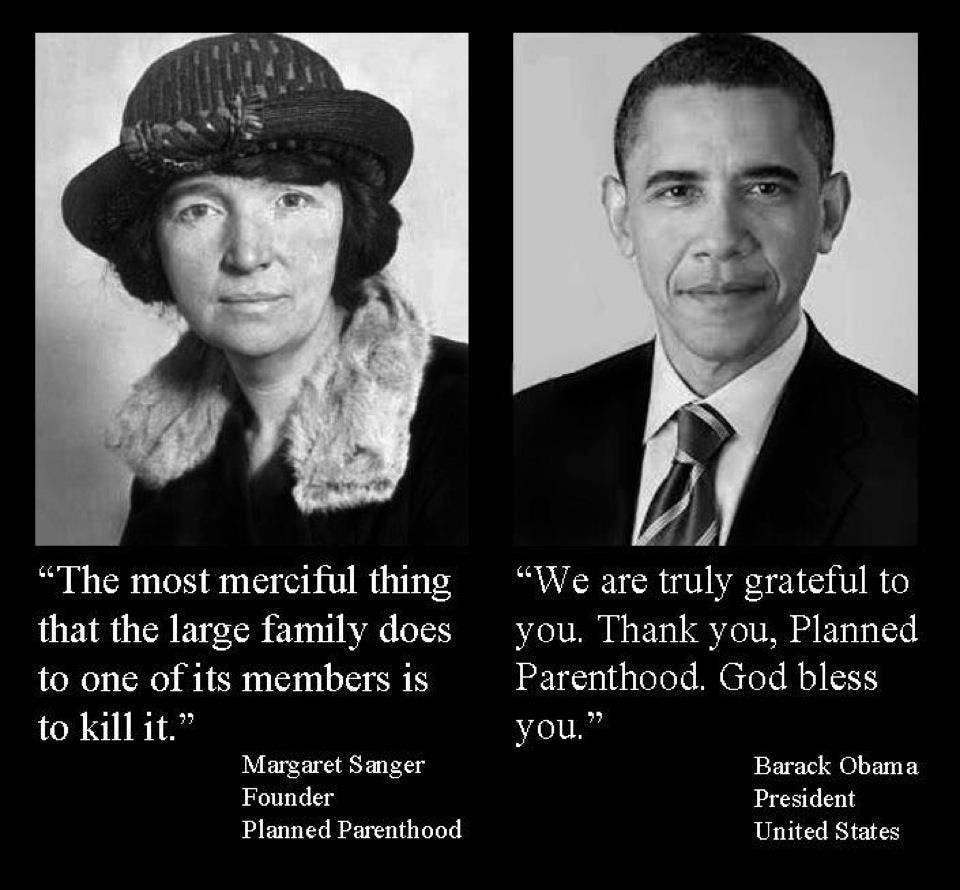
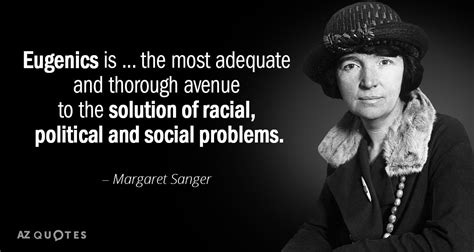
To most people, Sanger would appear as a complete racist psychopath. To others, she was a pragmatic realist. Such oppression and human-atrocity consistently would be explained-away applying the realism lens.
By the 1960s, the threat of nuclear war was no longer the only topic of discussion amongst the “noble elites” steering American policy. The Population Bomb was published in 1969, which essentially claimed that global population was a bigger threat than a nuclear apocalypse. Nixon, Kissinger and many other American elites took immediate and decisive action on the matter:


Kissinger, of course, was front and center. In 1974 he published The Kissinger Report:
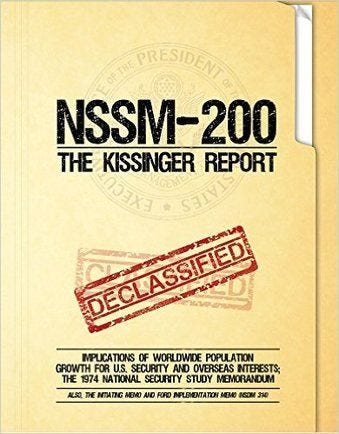

Invoking the spirit of Margaret Sanger, Kissinger believed the population of the third world carried the biggest threat to America.
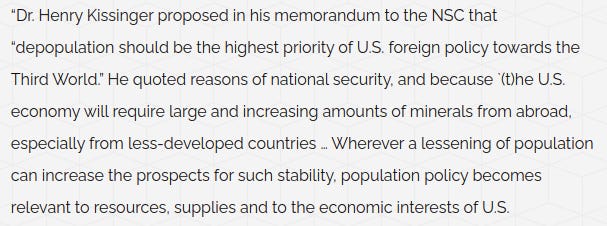
For Kissinger, eugenics was not personal, it was simply “political realism”. An obscene policy to protect the world was just a modern expression of Realpolitik.
Chyna
Chiang Kai-Shek was the recognized leader of China, also known as the Republic of China (ROC). In 1945, the ROC joined the UN and was recognized as the legitimate government of China. During the civil war between the ROC and Mao’s CCP, Chiang was forced to retreat to the island of Taiwan.
Chiang continued to run Taiwan as a Republic and maintain strong ties with the US. Chiang’s wife, Soong Mei-ling enchanted the US leaders, and in 1943 she addressed the House of Representatives, embracing the virtues of America’s own Republic. Acting as a government in exile, the US continued to recognize the ROC and continually opposed the replacement of the ROC with Mao’s CCP as the legitimate government of China. This remained the case until Kissinger’s secret visit to China in 1971.
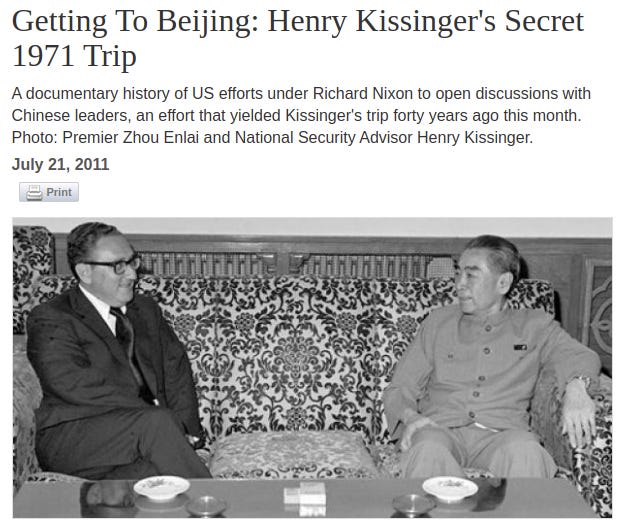
Up until this time, CCP China was rapidly descending into yet another backward failed communist state. Hundreds of millions of Chinese were broke, destitute and thousands of years of their Confucian culture had been needlessly and brutally purged. Mao had created a nation that literally had only one commodity left to offer the world; slave labor.
Both Nixon and Kissinger believed that fomenting ties with the CCP would isolate the USSR and further exacerbate its decline. While this may have been true, the consequences of such a relationship would change the world forever. Coincidentally, it would be the same globalist corporations that profited during 1917-1945 that would again benefit. The other clear winner in this venture was the CCP:

Fostering a relationship with the CCP would eventually create an enormous labor arbitrage for globalist corporations. The slave labor wages paid to factory workers in China would be a fraction of the wages paid to American workers.
Up until the 1970s, the average American family could be raised on a single middle-class income. As the globalist corporations offshored their production facilities to the CCP, this great American dream would gradually transition into a hellish nightmare, as we shall unpack later.
Kissinger and Nixon’s “normalization” of relations with the CCP occurred at a time when the communist dictatorship was openly testing nukes and antagonizing the US in Vietnam:
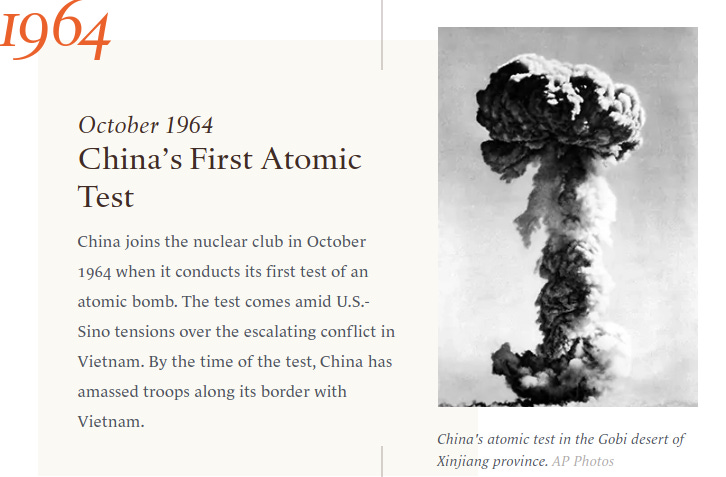
https://www.cfr.org/timeline/us-relations-china
Kissinger’s tough stance against the world was simply empty rhetoric. At every turn America was being weakened by strange and contradictory diplomatic policies. These were policies with global-reach and Kissinger always seemed to be directly involved.
In 1971, Chiang Kai-shek’s claim as the legitimate government of China suffered a major blow. As part of the deal with the CCP, a motion was passed at the UN to recognize the Peoples Republic of China (CCP) as the sole legal government of China. Chiang’s ROC, a government founded on the principles of a Republic, had been betrayed. Kissinger and Nixon were well aware of what had transpired:

Mao passed away in 1976 and when Deng Xiaoping came to power, he upheld the CCP’s end of the bargain. He made a series of sweeping economic reforms in 1978 that would allow China to be opened up to the rest of the world. Globalist corporations could finally begin to profit from China’s cheap labor. The Prussian infiltration of China was solidified and the great labor arbitrage had begun. Billions of citizens from the Western middle class would begin to see their standard of living gradually decline in the process.
On the issue of a declining middle class; Kissinger, of course, had a plan.
Countering Intended Consequences
Until 1971, America and the West were enjoying unprecedented economic growth. The debt from WWII was almost completely repaid, and low and middle wage earners were enjoying remarkable prosperity. In many cases, a single income would be able to finance a house and raise a family.
After the Kissinger and Nixon Chinese deal, Western capital would begin to flow into the CCP. Factories that were once the economic pillars of American towns would be shut down and rebuilt in China. American jobs would be lost and wage growth would stagnate. Middle class prosperity was coming to an end.
To counter this pending economic malaise, President Nixon used his emergency broadcast powers. Interrupting the TV show Bonanza, Nixon announced the end of the US Dollar gold standard. It was an action that was known as the “Nixon Shock”.
https://www.youtube-nocookie.com/embed/pGn_uiEw0ig?rel=0&autoplay=0&showinfo=0&enablejsapi=0
With the Vietnam war raging, the US was already living well beyond its means and was clearly unable to maintain the USD to a gold standard. The removal of the gold standard unleashed the full potential of the US Federal Reserve to print money. The average American would have their declining prosperity hidden behind a wave of inflation.
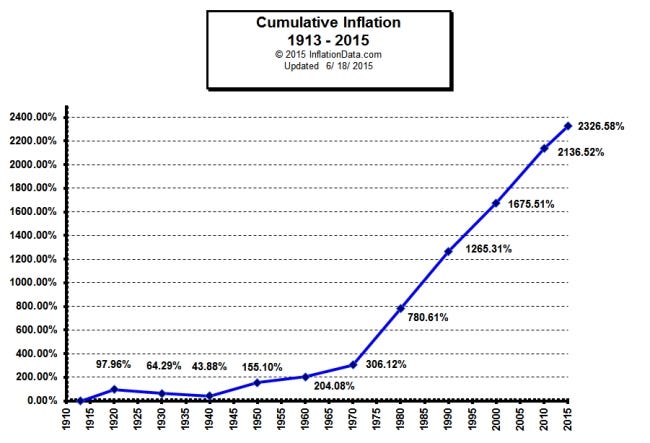
Prices took off after 1971, and never looked back. Many initially thought that rising prices would stimulate wages and the economy equally, however globalist corporations were already preparing to move their operations offshore, and were shutting down production in America.
American unemployment skyrocketed at the same time prices skyrocketed. Stagflation had hit the entire Western world. It was a miserable time for Main Street. The US Misery Index reached an all-time high. (the Misery Index is calculated by adding inflation and unemployment)
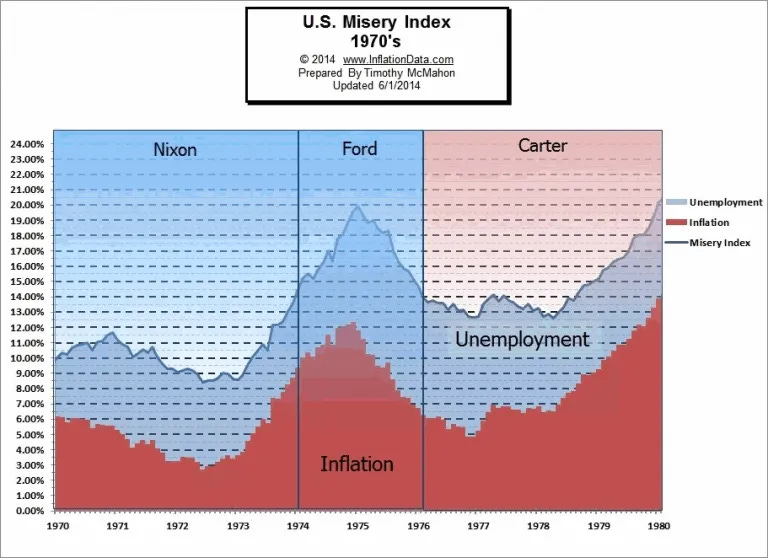
In addition, by de-pegging the USD from gold, Nixon and Kissinger created a currency vortex. No one wanted dollars anymore because it was no longer seen as a safe store of value. Kissinger had an answer:

The Petrodollar was born.
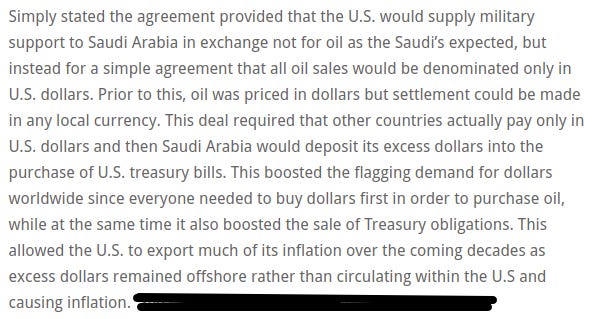
Recall in the #PrussiaGate article, The House of Saud, the Muslim Brotherhood was co-founded by Adolph Hitler. After WWII, this radical islamic group was controlled by the CIA and part of the organization was transferred to Saudi Arabia. The Saudis would lead the charge in the petrodollar complex, which eventually led to the complete destabilization of the Middle East.
https://truthtrench.org/?p=3637&preview=true.
For Kissinger, the deal was simple: Price oil in USD or feel the might of the US Military.
The decision to “normalize” relations with the CCP cost American jobs, capital and prosperity. Not only that, America was now on a permanent war footing in the Middle East. Nixon had turned the USD into a fiat currency. In history, no fiat currency has ever survived. Kissinger was a devout student of history and understood that the American situation was unsustainable.
Unfortunately, he had a plan there too.
Thucydides Trap
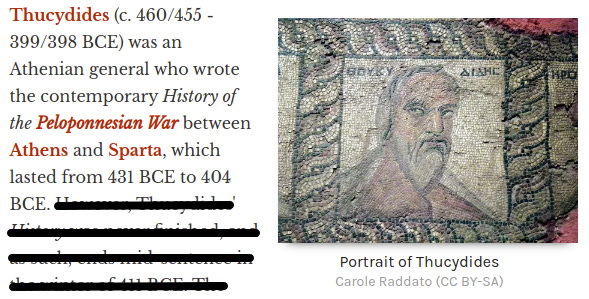
https://www.worldhistory.org/Thucydides/
Kissinger is perhaps best known for his observation known as the “Thucydides Trap”
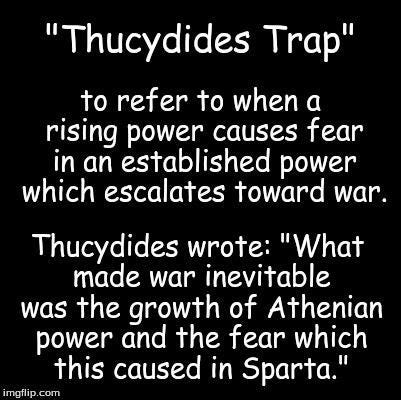
Henry Kissinger was a strong advocate of studying history, especially Thucydides.
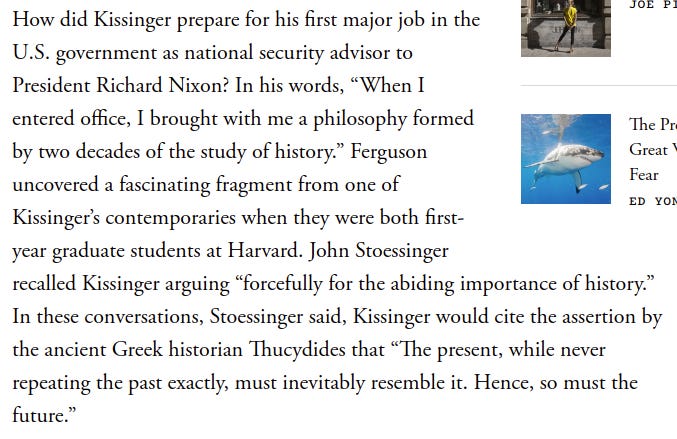
Kissinger’s career hardly resembles a man who defended American supremacy. In fact, he was chosen to be part of a “noble elite” that would decide the fate of America. This concept was the antithesis of the intention of the founding fathers. Moreover, a nation controlled by a chosen-few was not only un-American, it was decidedly Prussian.
Nuclear proliferation, eugenics, the betrayal of Chiang Kai-shek, the embracing of communist China, ending the gold standard, creation of the petrodollar complex and the need for unending militarily enforcement in the middle-east has not boded well on the average American. The immense prosperity once enjoyed by the middle class is long gone.
The question that logically arises, is where does this all end?
One of Kissinger’s former students and Realpolitik advocate, Professor Graham Allison, applied Thucydides Trap in the modern era. It perfectly describes the potential of war between America, a nation that has been structurally weakened over 50 years, and Communist China, a nation that has been structurally empowered over the last 50 years. Both nations destinies have been profoundly shaped by Henry Kissinger.


Professor Graham Allison went on to write a book about the subject.
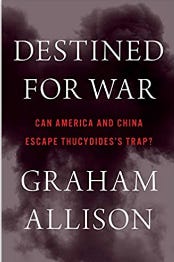

Allison was emphatic that President Trump’s MAGA policies would be the cause for a catastrophic war with China. The Washington establishment was clearly in a state of panic at the economic indicators under Trump’s presidency. Millions of jobs created, factories returning to America, rocketing stock market, energy independence and middle east peace was rapidly turning the Deep State’s plan on its head.
What was the Deep State’s plan?
To avoid a catastrophic “Thucydides Trap” resulting in war with China. This was to be achieved at the exact moment China’s rise would surpass America’s decline. At that moment, America would not slowly decline, but collapse into the abyss. Having been made economically, militarily and morally bankrupt, America would be unable to maintain its supremacy on the world stage. Like Prussia before it, America would be sacrificed, and disappear into history.
Henry Kissinger would be known as the architect behind it all. In 2015, when everyone believed that Hillary Clinton would become the next President, Kissinger was so confident of his strategy that he published a book:
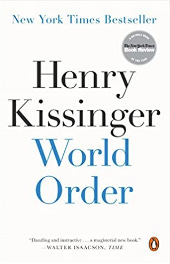
In Not Since 1917, we construed that Prussia never truly disappeared, but instead morphed into a matrix of globalist corporations. In turn, those corporations profited immensely off the government policies implemented throughout the world. Henry Kissinger’s influence provided an incredible opportunity for these corporations to expand their dominance on the world economic stage, particularly within China. Investment in China by these corporations has metastasized.
When President Trump left office, the panic by the establishment subsided. Just one day after the inauguration of the child-sniffer-in-chief, Resident Joe Biden, one of the most powerful investors in the world declared that things will now go back to normal now that Trump is “gone”:
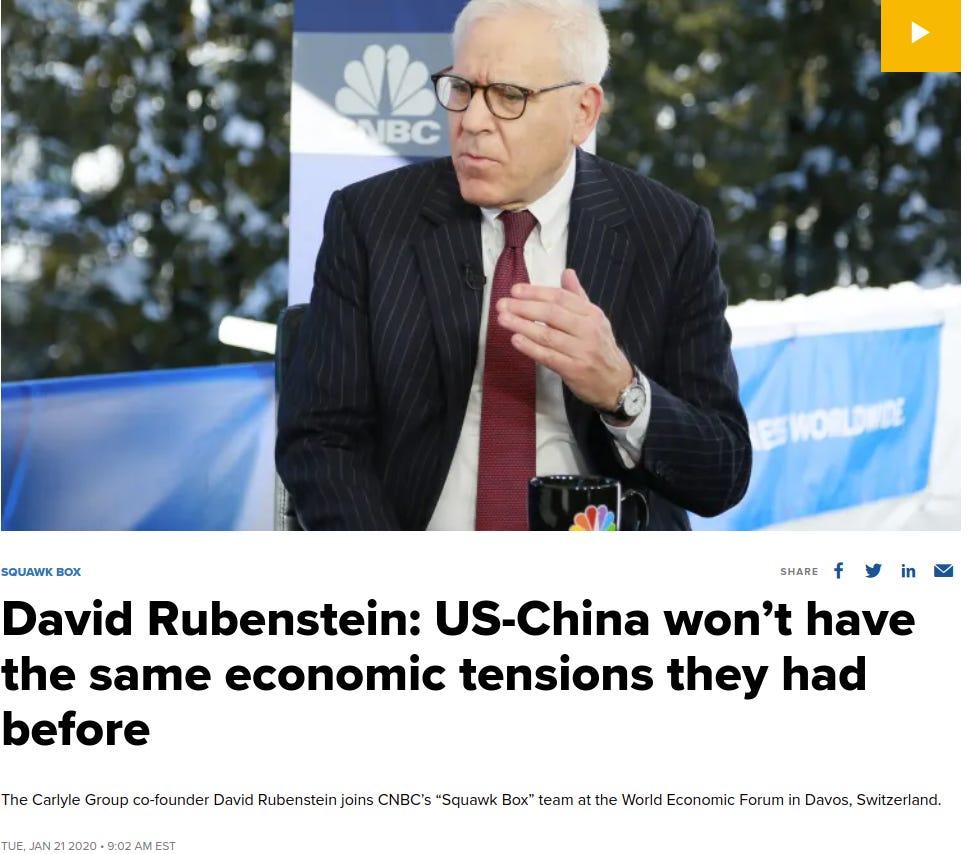
The dubious dealings of the Carlyle Group and their investors, such as disgraced Saudi Al Waleed bin Talal, needs no introduction. What’s most interesting is that David Rubenstein made these comments in Switzerland at the annual World Economic Forum (WEF). Even more interesting is his position as president of the Washington elite gathering, the Alfalfa Club.
We have discussed at length the Prussian origins of the Alfalfa Club. In 2013, for their 100th anniversary, the Club decided to honor the man who had done so much for their cause:
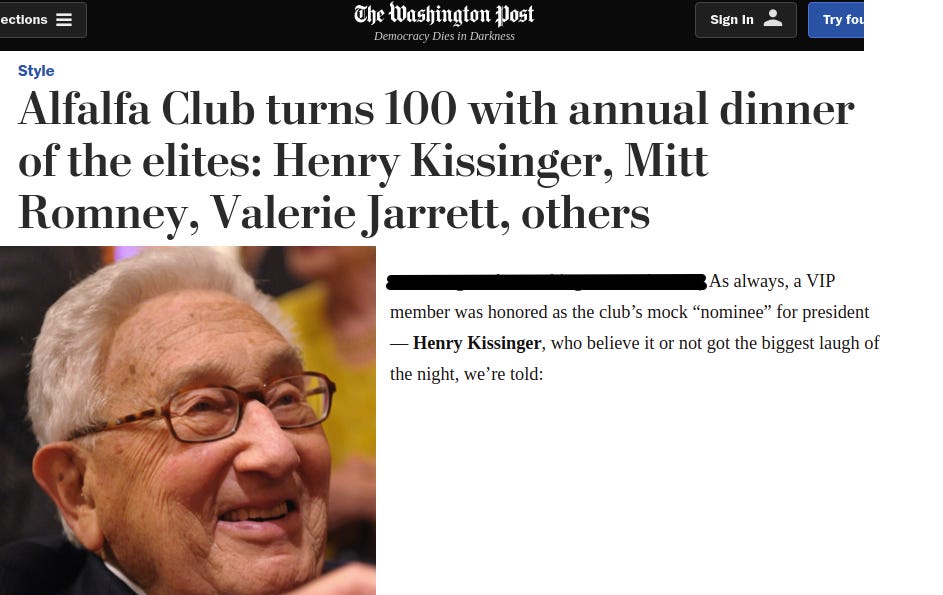
It is clear that the Washington establishment viewed Henry Kissinger as the man who had provided unimaginable wealth to the globalist corporations and that Donald Trump represented an existential threat to their new “World Order”.
Inconceivably, there is yet more to reveal about Kissinger’s legacy.
The Teacher
As stated earlier, professor Graham Allison was a former student of Henry Kissinger. During the 1960s, Kissinger would mentor many students at Harvard, providing them with the insights he had gained in applying Prussian Realpolitik on the world stage.
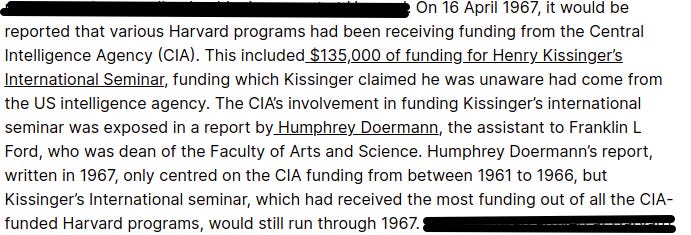
It is speculated that Kissinger was using the “International Seminar” as a recruiting mission for the CIA. While this is hard to substantiate, there is clear evidence of this being a distinct possibility:
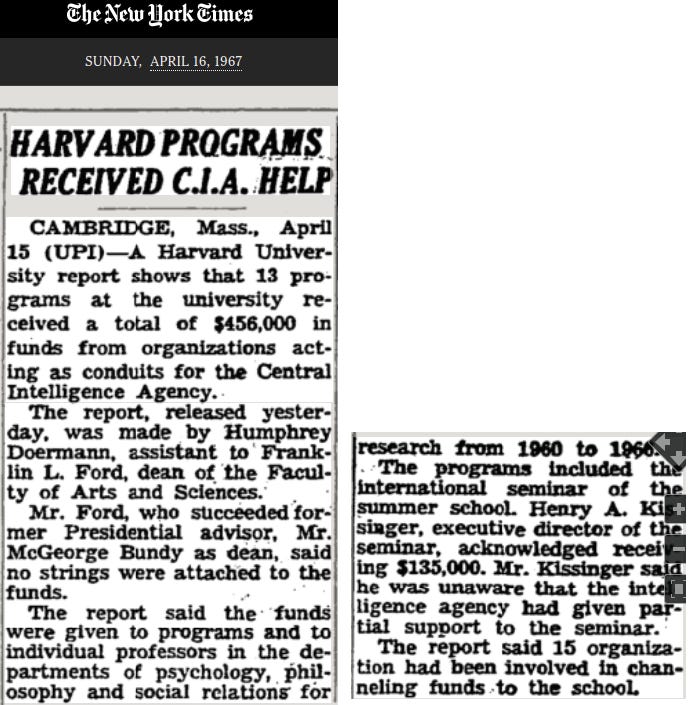
From this teaching platform, Kissinger would have a profound effect on any individual who shared Kissinger’s love of Realpolitik, as well as nuclear proliferation, eugenics, China, globalist corporations and the plan to usher in the New World Order.
This 1967 initiative likely birthed one of the most-significant global enemies that humanity has ever faced:
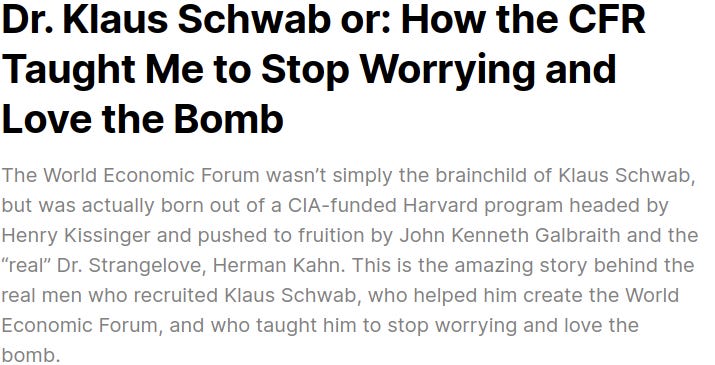
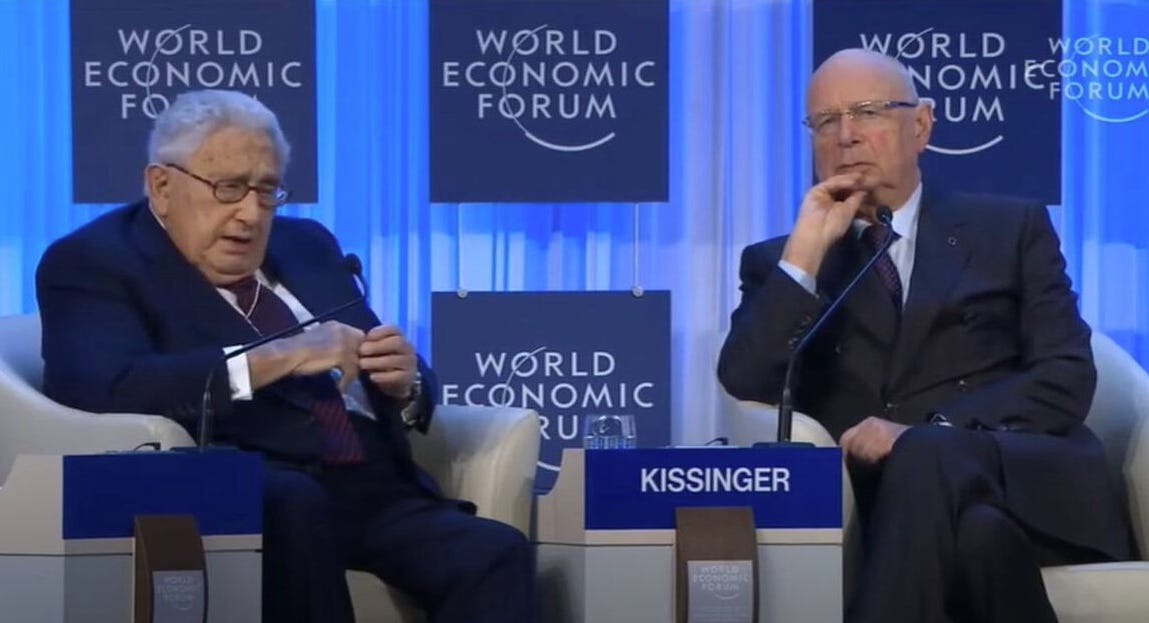
To be continued…
https://www.newyorker.com/magazine/2020/05/18/the-myth-of-henry-kissinger
ibid
https://www.worldsecuritynetwork.com/Other/tillmann-dietrich-1/Who-was-Dr.-Fritz-Kraemer
https://www.newyorker.com/magazine/2020/05/18/the-myth-of-henry-kissinger
https://direct.mit.edu/jcws/article/22/2/58/95278/We-Are-Not-a-Nonproliferation-Agency-Henry
https://www.salon.com/2015/11/10/henry_kissingers_genocidal_legacy_partner/
https://opa.hhs.gov/reproductive-health?index.html
https://china.usc.edu/getting-beijing-henry-kissingers-secret-1971-trip
https://china.usc.edu/getting-beijing-henry-kissingers-secret-1971-trip
ibid
https://www.theatlantic.com/international/archive/2015/11/kissinger-ferguson-applied-history/417846/
